|
| 2015 | JAN | FEB | MAR | APR | MAY | JUNE | JULY | AUG | SEP | OCT | NOV | DEC |
| 2016 | JAN | FEB | MAR | APR | MAY | JUNE | JULY | AUG | SEP | OCT | NOV | DEC |
| 2017 | JAN | FEB | MAR | APR | MAY | JUNE | JULY | AUG | SEP | OCT | NOV | DEC |
| 2018 | JAN | FEB | MAR | APR | MAY | JUNE | JULY | AUG | SEP | OCT | NOV | DEC |
| 2019 | JAN | FEB | MAR | APR | MAY | JUNE | JULY | AUG | SEP | OCT | NOV | DEC |
| 2020 | JAN | FEB | MAR | APR | MAY | JUNE | JULY | AUG | SEP | OCT | NOV | DEC |
| 2021 | JAN | FEB | MAR | APR | MAY | JUNE | JULY | AUG | SEP | OCT | NOV | DEC |
| 2022 | JAN | FEB | MAR | APR | MAY | JUNE | JULY | AUG | SEP | OCT | NOV | DEC |
| 2023 | JAN | FEB | MAR | APR | MAY | JUNE | JULY | AUG | SEP | OCT | NOV | DEC |
![]() Read current month's Daily Reflections
Read current month's Daily Reflections
![]() Table of Contents: Daily Reflections
Table of Contents: Daily Reflections
![]() Youtube Channel: Video Listing
Youtube Channel: Video Listing
May 2023

(Photo:Janet Kalisz)
Reflections May 2023
May is that prime time for flowers wild and tame to adorn meadows, roadsides, May Poles, and cemeteries, lapels, youthful hair, rose garlands on sweaty Derby winners, Mother's Day bouquets, prom queens, sick rooms and dining tables. May announces freshness before summer's heat and invites us to work our gardens and landscapes: the awesome sights of spinach, Swiss chard, lettuce, radishes, red-stemmed beet greens, cabbage, broccoli, kohlrabi and blooming chives; the tastes and smells of sun-ripened strawberries, rhubarb pie, sour cherries (if ahead of birds), ox-eyed daisies, iris, blackberry blossoms, peonies, poppies, rocket larkspur, black locust flowers, and Kentucky coffee trees. May comes but once a year, so make the best of it.
Poppies |
New Book Announcement!
Paperback – March 16, 2023

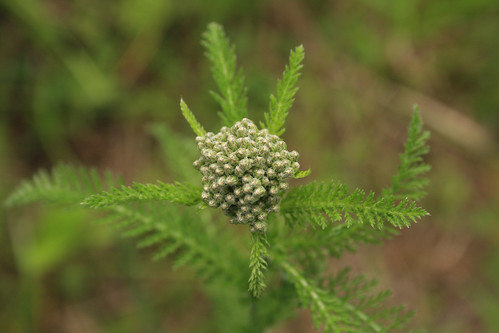
Buds of the yarrow, Achillea millefolium.
(*photo credit)
May 1, 2023 Recite A Patriot's Prayer
Lord, Today is our National Prayer Day,
but You expect that we should pray every day,
so what makes this really so different?
Is it because we have to pray together at times,
even when we pray differently, worship
inour own way, speak in different words?
We may not look east, bow, bend a knee, move our lips,
stretch out our hands, or fold our hands.
But at times we need to pray together.
A patriot who loves his land must pray.
Jesus weeps over Jerusalem; we weep for America.
If we but knew the things that are to come.
Patriotism means we love and support our country --
not when right or wrong, but only when right,
and strive to make it right again.
We are to show the world our love,
not flaunt our military might and power,
but be people of a sincere and humble heart.
Perhaps a false manifest destiny of the past
was our expression of immaturity,
with streaks of goodness intertwined.
We do not want other nations hurt in any way,
we wish them prosperous futures
and a higher quality destiny for their people.
For we simply cannot police the world;
such is the goal of an evil spirit
and deserves to be understood and denied.
Lord, give us a humble and contrite heart,
make us a people who can find the right approach,
to refrain from violence even when attacked.
Teach us to give and not to count the cost,
to serve a needy world with open arms
like natives received our ancestors.
Make us mindful of future generations,
for those who need what we regard as luxury,
and teach us to use all things in moderation.
Give us the strength to come together,
not checking if others bow or fold their hands,
but united with a clean and humble heart,
One not proud or boastful or feeling superior,
or set in a self-righteousness of the past.
But only give us an open and clean heart.
Help us see what is right and what is wrong,
to choose the former in a national way,
and do it now, and do it well.
Amen.

Scenic landscape in path of Keystone XL Pipeline.
(*photo credit)
May 2, 2023 Moving Spiritually to a Non-Carbon Economy
Can we avoid a climate change catastrophe? What wouldthis entail? Some componentsare described by knowledgeable environmentalists: ice sheet melting, rising oceans, more frequent flooding and droughts, damage to wildlife habitats, melting of permafrost and release of highly potent methane, and increased numbers of severe forest fires. The rising of global temperature is a raw reality that faces the non-spiritually inclined,as well as those who affirm a future for our Earth.We can speak of the non-spiritual, in contrast to those who need a deeper spirituality to believe we can save our threatened Earth without causing untold suffering to the many possible victims. Do some people know and see and yet feel no results can be obtained given the current situation of consumer distraction and addiction – they may end in despair?
Denial is the first category of those who cannot face climate change reality. One can find articles and hear talks stating that some pollution may be occurring, but not to the degree that the environmental experts say. Their number is diminishing and the frequency of the message declining. However, more belong to this category that chose to admit, and there is no firm spiritual foundation for their views. In fact, it does not take much sophistication to affirm that the summers are hotter and more uncomfortable.
Excuse is another approach. A false humility expresses the view that one can do very little or nothing about climate change, without regarding personal energy conservation or efficiency as of any moment. For many, this is premised on the false assumption that modern technology can solve all problems,if the experts will have the opportunity to act now. This is a blind trust in material experts and their expected success; their supporters admit that climate change is beyond them and ought to be deferred to those with greater expertise. For many of them, all things are humanly possible if enough resources are directed to the problem at hand.
Escape is a final category and embraces those who recognize that the world is threatened by climate change, but say that this is something so psychologically disconcerting that they must flee from giving it further attention. Some of these would regard themselves as good Christians, awaiting the judgment and second coming of the Lord; for them, the faster the destruction of the planet occurs, the quicker will come the end of the world. Or in a more cynical manner they may say, who cares if it does affect me and my everyday activities?
In answer to these three types opposition, we believers in the future place our trust in the providence of the Almighty. All the while we must redouble our efforts in caring for the environment and encourage the disconcerted to join in a grand collaborative effort. This must include praying for and bringing peace to our fractured world, a necessity for harmonious cooperation at a global level.

Native Kentucky "rambling rose," Rosa setigera.
(*photo credit)
May 3, 2023 Championing May Flowers
In our part of the world May is the floral month with a wide variety of late spring flowers such poppies and azaleas – and of course the Derby Day’s “Run for the Roses” at Churchill Downs in Louisville, the first leg of the Triple Crown in racing. Yes, an event where May flowers play a prominent role. The highly celebrated winners (thoroughbred horse and jockey) are adorned with garlands of roses.
Our flowers of May delight all in the northern temperate zone. Flowers galore! For a dozen years we have begun each month's reflection by a seasonal flower along with a simple verse and photos, generally from Janet Kalisz's extensive flower photo collection.
Flowers are a natural complement to a broad variety of environmental issues; they set a tone during times of distress; their obvious beauty gives us a sense that the future will be better. Flowers open our souls to search horizons for both hope and courage to preserve the best of the past. We realize that spring wildflowers flourish for such a short while before the spreading tree foliage bids them adieu for another year. Let's appreciate fleeting beauty and make the best and enjoy God's floral gifts, for our time is short. Both tame and cultivated flowers speak to us and teach us that we can reclaim a damaged world. They are a universal symbol of love and affection.
Flowers are integral to Earthhealing and remind us that we need constant encouragement in the difficult work ahead. Flowers, wild and tame, mellow our bellicose nature while energizing us for more peace-loving, but still radical, action. As freshly cut, flowers sacrifice themselves to brighten special situations. "Say it through flowers," florists proclaim: bouquets for the newly-wed, corsages for the party host, decorations for the banquet, prizes for the best at the conference, tokens for departure, adornments at the altar, wreathes on the casket, and reminders of loving care at graves.
Where strategically located, cultivated flowers drive away pests and increase the economic value of property. But utilitarian factors are not the only reason for promoting flowers. They satisfy all the senses: their color attracts us as well as bees and other pollinators who add sound to the floral surroundings; their smell is also attractive, for we often want to just enjoy the fragrance; their petals have a special feeling; and some even taste good (e.g., violets, some lilies and nasturtiums) when used to garnish salads, especially during this “Salad Month.”
Being in an extended family of flower lovers is a blessing. When visiting Germany and France, we find kinfolks graveyards filled with planted flowers; during summer and fall, window boxes are abundant.My now deceased cousin Marthapointed to her window box in Alsace and said "geraniums," her one English expression. That family fondness for flowers crossed the ocean; today this is expressed in our flower plots that define home as a place of return and rest. Flowers speak to earthly places but also point to a heavenly one as well.

Spring flower garden with fresh blossoms.
(*photo credit)
May 4, 2023 Observing the Fulfillment of Scripture
What the prophets spoke about came true with the coming of the Messiah. We are all aware that Jesus pointed out passages fulfilling his coming, his suffering and death, and his resurrection. However, once saying this, we are also especially aware in these troubled times when prophets of doom speak out as though they have the final word on the world soon coming to an end. How do we deal with authentic fulfillment and false foretelling?
St. Paul and St. Peter speak in their letters and in the Acts of the Apostles of pertinent passages in the Old Testament that indicate the coming of the Messiah, that he would be a suffering individual, and how his presence would be continued through the ministry of his followers. However, many at the time of Christ expected the Messiah to be a political leader, paving the way for a glorious state, independent of pagan Rome and shining before the entire world. These expectations occurred even at the time of Jesus’ Ascension, and were only corrected by the graces of Pentecost.
Bringing the fresh message of Good News to others is our calling.While a message that comes with interior peace and trust, it is still one that allows us to imitate the Lord. He was opposed by disbelievers and made to suffer. The followers of the Lord can expect the same, and so we find that many in various parts of the world are suffering persecution at this time for their Christian beliefs. With Pentecost and the Holy Spirit, the nature of this following was gradually understood,along with the power of the Risen Lord.
Now we read or hear others who appoint themselves as forecasters of what is immediately to come. These consider their insights to forecast the near future, even though Jesus said only the Father would know the day and hour. These forecasters mix a view of Scriptures as word being spoken here and now, with word reaching a little ahead of what the teller has some sort of insight to know. In one sense they may be right in using the word “soon,” for in the history of the world that time will be quite short, considering a fourteen-billion-year history since the Big Bang. Yes, Christ will soon come again, but let us not speculate on when that will be. Far better to know our work time is short and we must focus on making the best of it.
Fulfillment now takes on a new and fuller meaning for us. We are more than passive observers of a fulfilled event; we are active participants in a fulfilling opportunity. As people who carry the Good News to others, we seek to fill and satisfy the hearts of many who burn for the Word of God. We are the ones called to become other christs, and we take on a proper messianic role of bringing salvation through our physical presence and actions. We play a role in fulfilling, for we make full the suffering of the Lord.
Let’s ignore the ones who think they know exact times of future events. Let’s rather discover it best to help make history with the time at hand and to leave the final closure to the Lord.

Five petals to celebrate Cinco de Mayo.
(*photo credit)
May 5, 2023 Recognizing Cinco de Mayo
Mexico is closely connected to the U.S. in more ways than just a long common border. Connections include millions of Mexican Americans who make our country verge on becoming bilingual and that is for the better of all; we all need to be proficient in two of the major languages of the world. Togetherness is better served when we can celebrate together -- and all people, rich and poor, working and retired, young and old, have reasons to celebrate. By collaborating we can strengthen bonds of fellowship with our neighbors.
This day is worthy of continent-wide celebration,for it is very important for creating a stronger partnership with neighbors on every side. On the 5th of May, Mexicans celebrate the defeat of the French army at the battle of Puebla in 1862 -- fortunately, eight years before my grandfather entered the French army. Let's not confuse this important Mexican holiday with their Independence Day, but it is their special occasion for celebration.
While we are encouraged to celebrate together, we do have work to do to bring us closer. We wince that our country has criminalized the act of returning after deportation to visit family left behind in the U.S. Our immigrations regulations are a true mess, and that is not worth celebrating. For years new migration legislation has been proposed and postponed over and over. We are now nearer through a piecemeal process of securing borders and allowing more of eleven million of the undocumented to stay and enter the pathway to citizenship. On their part it is non-criminal to desire to come north for a decent job. A more viable guest worker program could help fill the need for farm workers to harvest our needed food crops. Why fault those who want to work and who are very proficient at their jobs?
Some will say Mexico is retaking its former territory (Texas, California, Arizona, New Mexico and Nevada) in a non-violent manner -- of immigrant entry, hard work at menial positions, and a dependable family orientation that is actually welcomed by many communities (check out our Ethnic Atlasof the United States on Amazon Books. The rapid increase to one-quarter Hispanic in the total ethnic composition in these states is not to be overlooked. The birth rate among the Hispanic population exceeds that of the Anglo population and challenges that of other races including Asian Americans. Hispanics see the future as theirs, and that may prove a welcome relief for a country that needs dreams of destiny as held by our ancestors at times of arrival. Let's celebrate the hard work of the many Hispanic laborers.
Why celebrate a feast of one national group over others? We celebrate St. Patrick's Day, Columbus Day, and Martin Luther King's birthday, though in different ways. Cinco de Mayo deserves some sort of recognition as a sign that we appreciate the contribution that Mexican-Americans make in the U.S. No one deserves this mutual respect and good wishes more than our Mexican neighbors. This is the largest ethnic group in our country.
RETIREMENT FOR BETTER OR WORSE
By Fr. Al Fritsch, SJ
This is something I ignored while not expecting to retire -- when I was healthy and anticipated working forever. But there is no forever in this mortal world and personal health takes its toll on mobility and energy levels.
Retirement comes in various forms. One of these is to see the occupation terminate either through firing by the employer, or the walking away by the employee -- events occurring in ever greater frequency at this time when there may be benefits awaiting the retiree.Another retirement method is to say "I'm sick" and the activity simply stops for lack of energy and stamina to complete the necessary work at hand. Actually, health never entered into my job plans and I anticipated working on and in my two parishes. The Bishop told me to work as long as possible. Then came the unexpected in mid-2022. Pastoral work was soon becoming too difficult for one who could no longer drive – and the affirming parishioners began to see inevitable change in the air.
These changes were acknowledged by both superiors and health workers; I was no longer independent, but now need 24/7 care. Over a half century of taking care of self was now suddenly giving way to a dependent status of which many individuals hate to recognize;but facing reality is good spirituality. We can fall and we need help to rise again. Thus came the decision that I should join elder Jesuits at the retirement and health center at Colombiere, in Clarkston, Michigan.Now I must call locally for help if I have trouble.
Such is life! It was hard to leave my good folks after two decades of work,still it had to be done. And even though I continue to update my "Daily Reflections", still the move was in the direction of lightened Retirement. Now,how can this be taken in a spiritual manner when the Lord calls and we may not have the stamina and long-windedness required for the work – and attention must be given to personal health?
Looking back, I feel many more could extend their own work time into their 70s and 80s, as I had – and this effort at questioning retirement would be ultimately beneficial to all concerned. I still believe that all in retirement need not be there,but should be giving professional and even greater service in new activities. If retirement affords a change for the better it is a good thing and I must recognize it as such. However, there are folks out there who see retirement as a play-filled time with little social cares in the world. Too often they are tempted to do nothing or to follow allurements and forget about others. This mortal life is short; let's make the best of it. Lord, let me face retirement in a more enlightened way.
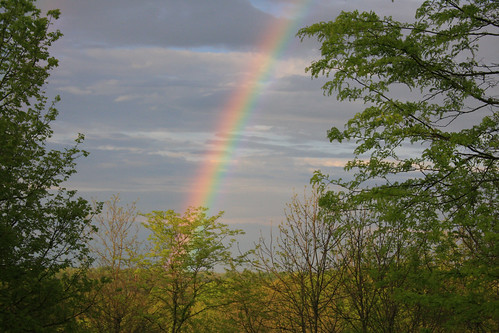
Early spring rainbow in Kentucky.
(*photo credit)
May 6, 2023 Celebrating Rainbow: God's Covenant with Earth
God said, 'Here is the sign of the covenant I make between Myself and you and every living creature with you for all generations: I set my bow in the clouds and it shall be a sign of the covenant between Me and Earth. (Genesis 9:12-13)
Make tomorrowanAstronomy Day when, if the weather is clear, we ought to spend a little extra time looking heavenwards. In this month when the unexpected sprinkles come on the warming days, we should be extra aware that rainbows can come right after the falling shower when a mixture of moisture and sunlight can allow awesome rainbows to appear. Whether a moment of reflection on clear starlit nights or those momentary rare rainbow occurrences during daylight, we ought to be a little more alert to God's gifts all around us.
Natural phenomenon reveal vivid colors. We look down at a dewdrop on a sunny spring morning and we see sapphire, emerald, ruby, or topaz, depending at what angle we look. This is one marvel that shows the dispersal of light into its various colors. Look at an oil patch in the sunlight and see the variation of light rays as well.
Observe rainbows with a clean heart. The sacred writer begins the passage in the Genesis 9:8-15 account by "see." We only observe God's creation by taking a moment to gaze and reflect, and then in an instant praise God in the midst of creation's beauty together will all creation. In all likelihood, we may be the only spectators praising God for this beautiful and temporary marvel of varied colors in a busy world, when others have a multitude of concerns that fill their mind.
The Noahic Covenant is present today. The covenant between God and all living beings (including us within the family of creation) is recalled with each rainbow, an ancient agreement sealed by God's word. This is the living world about us, whether a fetus in the womb, a coyote pup, or a struggling flower in the crannied wall. Each seeks the glory of life in its own existence, and we are especially privileged to thank God for these and all struggling forms of life. By giving a moment of respect, our good will becomes contagious and spreads with a planetary rippling effect out to all the unique creatures that are our neighbors.
Let's not avoid positive actions. People often tend to run away from an accident rather than to help. The Earth is presently hurt by the accident of overuse and harmful misuse of resources. We are called to be Good Samaritans, creatures of the Noahic Covenant, people of the New Covenant. If Earth is threatened by climate change, we are called as Easter people to address the issues and help modify the situation. We cannot deny what is happening, excuse ourselves from what needs to be done, or escape to other allurements. Rather, we are to affirm the current state of affairs, accept our joint responsibilities, and enter the fray. Let's become rainbows to others: observe, follow, and act as models of others to follow.
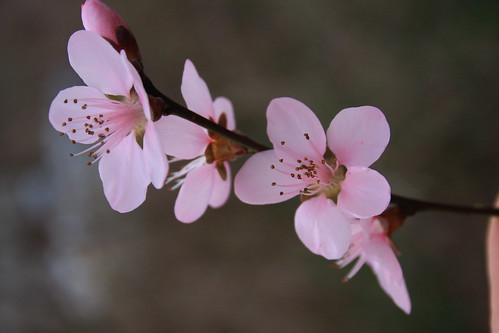
Wild peach, blooming at garden's edge.
(*photo credit)
May 7, 2023 Proclaiming Jesus: the Way, Truth and Life
I am the way and the truth and the life. (John 14: 1-12)
In this season of Easter, we both discover Jesus as way, truth and life, and in the spirit of the season of renewal, we become other christs and try to imitate him in our own lives.
Jesus, the way -- direct route to salvation, moral virtues to live by, road map on our journey, gate of God, path by which the Father is known to the world (John 1:18; 12:45; 14:9), trail to Calvary, venture to save others, passage into the New Covenant, road taken together, focus of our earthly sojourn, and opening to future glory.
Through our lives we show confidence in the way we journey to God, and we offer gentle help to others on their road to glory as constant companions. Many are wandering about not knowing where they are going; we must be the compass to help them rediscover the straight and narrow path with their feet planted on the ground.
Jesus, the truth -- teacher par excellence, message found in a person, compass of our intellectual pursuits, foundation of divine understanding, goal of our constant questioning, faithful witness to the Father, eternal word, willingness to teach through service, Good News proclaimed to all creation, personification of our worship "in spirit and truth" (John 4:23), Kairos or the acceptable time of opportunity, delight of the Father.
We present the Good News and show others that it is part of our evangelistic mission through the joy we exude to others. We are called not to lord over all creation as worldly tyrants, but to serve them by showing the fundamental truths that keep us secure. Together with trust we can help establish the Kingdom of God.
Jesus, the life -- perfect life, totally of service, knowing the Father present in the Son, offering to others as Body of Christ, celebrating with the happy ones, suffering with those who are persecuted, witnesses to Good News, giving the Bread of Life, dying so others may have life, forgiving and healing, sending the Paraclete, and exuding eternal Love.
We are deeply grateful in being invited into the Divine Family through the grace of Baptism. We are to live a life of enthusiasm (the God within) in the calling to be a chosen race, a holy nation, God's own people. Through our vitality, we enliven and give hope to a tired world of cynicism. We inspire others to rise above allurements to participate in building a new world. Life is worth living through meaningful service to our brothers and sisters.
In this time of confusion and difficulties, it is all the more imperative that we imitate Christ in affirming him as way, truth and life through our own service to our neighbor.

Black rat snake, Elaphe obsoleta, free after being caught in debris pile.
(*photo credit)
May 8, 2023 Recognizing May as the Perfect Gardening Month
For us in the temperate portion of the Northern Hemisphere we discover that May is the prime month for successful gardening. This is the time to stop planning and swing into action, to till and sow and plant to allow time for a plentiful harvest by autumn. Granted, as mentioned often, that an early start is better, still for us in this part of America this is the final month before the heat of summer takes its toll on tender plants.
In May we gather in spring greens in all their freshness (scallions, radishes, lettuce, spinach, and other early varieties along with poke shoots). The peas, if planted in February, are ready for harvesting as well. It is the month of garden salad and the first of the strawberries. For those of us with limited garden space, we complete the late spring planting as the space for greens is vacated. We do this by planting and sowing our tomatoes, peppers, melons, pumpkins, cucumbers, beans, and okra along with summer herbs. We continue to harvest, but allow new plants the time to grow. In fact, the spring plants still to be harvested serve as living mulch until the introduced summer plants produce more of their own shade cover.
May is the time to add flowers to make this an inviting garden, and one protected from bugs through the use of marigolds and other flowers that pests avoid. May is the time to finalize the garden arrangement in order to produce a moving floral show during the year as each plant comes on its own. Many have grown plants from seed and this is transplanting season; others of us purchase the things we want from garden centers and consider ways of economizing space so the entire area gives a sense of garden glamour. Consider sprinkling the area with cosmos, for these give a variety of color to late summer and autumn; observe carefully so as not to remove the starting flower plants with the weeds.
As the month progresses, we have to replace the sowing and planting with tending and thinning. Many part-time gardeners are drawn to other activities and neglect that critical time needed for regular garden attention. If rainfall cooperates and we do not have to water regularly we tend to overlook the growing plants for periods of time. However, in our global warming conditions hotter weather comes soon enough and so do weeds. This is the time to conquer these unwanted plants through mulch and tilling.
We often hate to think what needs more growing space, but this too requires discipline. One good thinning procedure is to replant in blank places the young vegetables that are too thick in spots. A second procedure is to simultaneously harvest and thin beets, radishes orchard tops as part of the thinning operation. Summer can come early so be on the lookout for pesky critters that may have survived our harsh winter. These can be removed manually at first sight. Make May the time to graduate into being a master gardener.

Creekside view, quiet moment. Anderson Co., KY.
(*photo credit)
May 9, 2023 Being Always Aware of Impulse Buying
Many purchases we make are done under impulse, if and when we have spare funds or imagined sufficient credit. Unfortunately, those living on credit accounts are less likely to withhold the impulse because they think for a moment that resources are there when they fail to consider the coming months. Material things are always enticing -- an added treat, a nice gift, a cute trinket, one additional comfort. Too often, we are fooled to "save" through a sale that really means "spend." We are at the mercy of attractive storeroom or Internet displays, or convincing words of merchants who say "If you buy this one, also consider buying this associated gadget, device, software, or auto accessories." Displays plus the targeted words of salespeople combine to move one when preparing to make a purchase to move to follow those added IMPULSES.
Few of us are immune from some degree of impulse buying -- especially if we have just saved on a reduced-price regular purchase. Stores and advertisers know that about half of all buying is by impulse. Shoppers say,"I went to buy a birthday card and look what I came away with!" Those added items are the result of seeing another good thing, or at least it seems so for the moment. Here we suffer from the addiction of the consumer culture that is seldom considered in all its materialistic reality. Is it the itch for convenience?Is the desire to equal peers with something fashionable? These steps may reduce panic-purchasing attacks:
* Get rid of the credit or debit card mentality and use only after determined to make a certain purchase -- since it is difficult today to continue solely on the cash or check economy;
* Construct a listing of short- and long-term needed items according to this established budget before going to the store or the Internet purchase site;
* Review the list immediately before entering the store to have clearly in mind what you came for, when you see so many other items on display. Stick to the list;
* Predetermine what items are being purchased and when moved to impulsively add an item, put this on a wait-and-see list so you have time later to decide. Most of the time impulses fade;
* Ignore much of the additional advertisements and enticing displays that don't pertain to what is the intended purchase item, and take particular care when talking about higher ticket items;
* Do not go to the grocery store when hungry. Eat a good meal and then shop for food and the impulses will be met in a reasonable manner; and
* Don't allow eyes to wander about at the check-out counter, for displays are meant for last moment impulsive buying.
After getting home from shopping review any additional purchases and honestly ask whether the extra is truly worth it. It might be time to join the ranks of "Impulse Buyers Anonymous," an informal group devoted to thoughtful purchasing.
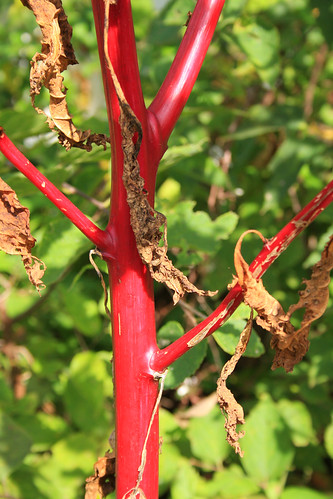
Brilliant red stalks of pokeweed.
(*photo credit)
May 10, 2023 HighlightingPokeweed Shoots and Berries
Any campaign to popularize our American "poke" or "pokeweed" plant (Phytolacca americana) does not meet with enormous success. In part, this is because the root of this beautiful plant is extremely poisonous and used as a natural pesticide. Pokeberry juice would always intrigue us as something to cover our faces and arms. A Filipino visitor to our nature center admired the natural splendor of our pokeweed plants. Maybe we Americans should treasure the beauty as well, especially since pokeweed can easily endure dry summers with no watering. Certainly, it proves hearty as well as pretty, for pokeweed is one of nature's treasures.
Poke shoots are the main ingredients of "sallat," an Appalachian delicacy that we eat in springtime and slightly beyond. When the shoots come up, one can prepare them in the same manner as asparagus sprouts. I like a cream sauce with some salt, pepper, and hot sauce to bring out the flavor. It is a near thing to asparagus and does not require the tender loving care that asparagus requires. Poke just keeps coming back year after year, though it likes composted soil best. I cut the shoot even after the red skin appears (most regard that as poisonous). I simply skin off the red layer and throw out the first and second pans of boiled water because, otherwise, the poke is a little bitter. The leaves are also wonderful and nutritious when prepared like spinach. I use both leaves and sprouts well into the growing year, though early tender ones are best. They regenerate rapidly.
Poke berries, which form in large clusters in late summer and autumn are excellent as an herbal remedy for aches and pains. Older mountain people boil some of the red juice (good for dying cloth as well) and feed it to ailing livestock. One older Appalachian herbalist recommended that the berries (it only takes about a dozen clusters for a year's supply) be frozen and one berry swallowed whole each day.One finds that common arthritis problems seem to be reduced. Remember to swallow the berry whole and not chew the seed, though I hear about people who gobble down berries in large amounts and have never gotten sick. Is it because poke berries are free, that they are not regarded as being as effective as $50-a-bottle pills?
Is it possible that poke's bad reputation is because some are allergic to pokeweed, just as there are those who can't eat nuts or are lactose intolerant? Perhaps! Though one must caution that the roots are truly poisonous (just as are non-fruity parts of the tomato), it does not imply we are to avoid the entire plant. Natural plants have different parts and uses and each must be respected. Start using them cautiously until you are sure you have no allergies -- and then enjoy poke, a gift from God.
For further information on the uses of pokeweed, see our YouTube video on this subject. It has been quite popular with about 200,000 hits along with a host of worthy comments worth scanning. It has become evident that poke has been used and appreciated for decades.

Curious about a new visitor...
(*photo credit)
May 11, 2023 Peacemaking in Times of Crises
The invasion of Ukraine by Russia in late February of last year, took a distracted world by surprise. How could this be in modern times that one nation would deliberately invade another for territorial gain? The Gulf Wars of the early part of this century were bad enough and now this all-out battle of drones and tanks and cruisers. And then came the evacuations, the millions of refugees, the rapes and the murders, and the missiles that seem to target schools and populated areas.
Does a friction between two Slavic peoples linger on with desire for additional land to be added to the Russian “empire” or its equivalent? What makes the matter worse is that when those of us in America consider the Ukraine as regarded in a genocidal fashion, we not only take sides and assist with materials both humanitarian and military; we also psychologically take sides and wish for and champion the militarily victorious underdog. The desire for peace at times seems to take a back seat to winning at all costs, even when we are aware that victory by the Ukrainians is a long distance away. Psychologically, we do not desire a quick fix, but a long-term win by the victims. We have taken sides and done so in a non-peace-loving manner. We have at least wished for a military victory by the underdog.
The Russian/Ukrainian conflict challenges our peace-making neutrality. We certainly do not want just anyone to win, for most of us have taken sides. At the same time, we are fully aware that a long-drawn-out struggle will cost the world economy and the nations involved both in economics as well as human life. PEACE NOW! We can say in all sincerity that conflict must stop, knowing that this is a major distraction from the global collaboration needed to curb climate change; we must work together to save our planet.
We Americans are poor students of history and don't realize that our basic unilateralism in a globalized world is highly flawed. Add to this our American heavy-handed firepower, planes, and mere presence, and success is not total. The imposition of a military solution does not work after the expenditure of billions of dollars in materials and thousands of lives. We simply must move beyond the use of new and more sophisticated weaponry. The goal of people may demand certain compromises, but it must not be delayed, for the world awaits a general peace so as to tackle together the global environmental issues before us.
Let us strive to pray for peace, to work through the United Nations and international bodies, and to promote both bipartisanship at home and global solidarity in coming soon to a peaceful solution. We should reflect on how bellicose we have become on this issue and be prepared to move in a more peaceful and loving manner, hoping that Russian leadership will become more cooperative in due time.
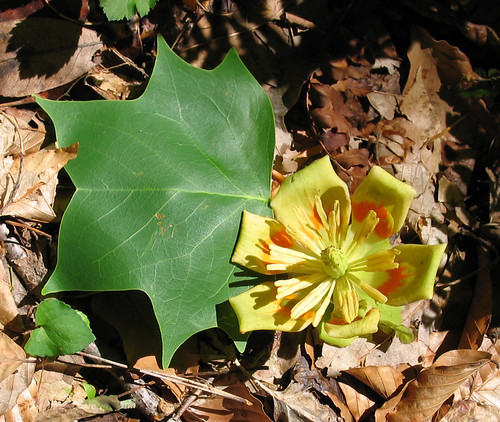
Tulip poplar flower and leaf, Liriodendron tulipifera.
(*photo credit)
May 12, 2023 Promoting Nurses as Model Caregivers
Florence Nightingale, a world-famous nurse, was born 203 years ago today; she became the model for all modern caregivers during the brutal Crimean War. Florence maintained a cheerful attitude while intensely devoted to patients in field hospitals, which lacked all but elementary sanitary conditions. She became a model for the many nursing caregivers who would follow.
I come from an extended family that has had about as many caregivers as farmers: four aunts were nurses and aides along with six first cousins as nurses and two also as medical doctors; and a number are emerging in the next generations as well. What strikes me, in knowing these and others of the thousands of caregivers helping the sick, is their practicality, as well as cheerfulness, even amid the most trying conditions. Nurses and doctors work long hours and yet are always ready for duty, even when sudden emergencies occur. They often earn good salaries and deserve to; they are more restricted by paperwork than in former times and find this draining; they are most willing to speak out about questionable medications for the sake of patients.
Nurses have many general characteristics that should be regarded by all budding Earthhealers. For one thing, they must be proficient and practical within a process that takes time, not expecting the impossible and yet awaiting recoveries as a goal. They soon discover that they cannot be lone rangers in health care, for it takes teamwork. Earth caregivers must stay hopeful when conditions seem quite dire; they are expected to maintain what in maritime language is an "even keel." They must exude confidence, even in a global warming epidemic. Health of our Earth is a common goal, and it will take coordination in order to preserve.
We all ought to hold nursing with the highest regard, because nurses give a needed dose of compassion in a busy world. Nurses help us all, and when greater needs eventually arise, I am certain they will be there for thankless but demanding tasks. Young people looking for careers ought to be encouraged to become caregivers and fill the vacancies that are now opening as we seek greater health services for all. We are inclined to ask whether wealthy nations expect nurses from poorer nations to supply our country's medical demands? Far better to encourage our own young and second-career folks to take up this noble profession and allow those noble foreign nurses to fill needed roles in their own countries.
Secondly, let's encourage some with practical nursing skills to become Earthhealers, either full or part time. Nurses can accept their limitations and that of those under their care. Caregivers must be, so they can do; they themselves receive care by osmosis in return and learn, through compassion for others, what they are to do and be. Let all Earthhealers learn from good practical nurses.
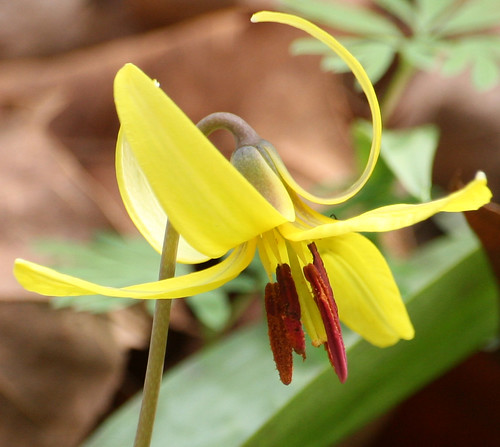
Dayhike to the Daniel Boone National Forest.
(*photo credit)
May 13, 2023 Creating Plans, Plans, and Summer Plans
We live in a world of time budgets and plans -- planned work, travel, retreats, and vacations. Those of us who think our lives are fleeting and time is precious accept the term "compulsive planners." We set aside time for yearly, monthly, weekly, or even daily planning that gives order to life. Some informal folks prefer to go through life unplanned, except for major celebrations once in a blue moon. Admittedly, I occasionally envy them. However, time is precious and fleeting, a gift to steward with some exertion of effort.
Compulsive planners ought to beware. Abrupt changes can come with an unexpected accident or mishap -- but even this eventually can be considered. Plans are not idols; illness can change "the best laid plans of mice and men." Some may ask -- do you include in your program your own demise? Remote planning certainly does have a place. The key to an unstressed planner is coping with unplanned events. We are not in complete control of our lives, for only God owns our time and we simply try to use it well. Having said this, let's ask whether we have started our summer plans? Here are some hints:
* Check out the basic itinerary and plan stopovers for the entire travel time, find travel distances between points, determine where major construction projects are occurring and plan alternative routes, and size up fuel and travel costs;
* Budget time and costs for trips allowing for places to stay, routes to travel, what to pack, papers (insurance, passports) to bring; also tell friends where you are going and how to be reached should emergencies arise;
* If doing outdoor hiking or other exercises, anticipate and inspect proper camping gear (backpacks, tents, sleeping bags, inflatable mattresses, flashlights, rain gear, food and utensils, clothes line, boots, matches in a waterproof container, and possibly a camper stove);
* If traveling near home, consider sights worth seeing, reasonable quality places to eat, or what should be brought along for snacks or meals, depending on mode of travel;
* Take along materials to help record time spent and trips according to the most comfortable mode: camera, daybook, or writing or other recording materials;
* In traveling by auto, when do you do the regular inspection and what needs to be taken (tire pump, jumper cables, and flashlights)?It is time to get the auto checked before a long trip; and
* Plan in some rest time during the summer and remember this is a good time to make an annual retreat and continue long-term planning.

Sisyrinchium angustifolium, blue-eyed grass, in Kentucky meadow.
(*photo credit)
May 14, 2023 Becoming Jesus' Loved Ones and Associates
I will not leave you orphans; I will come to you. (John 14:17)
No one wants to be an orphan, and Jesus knows this; he wants our friendship, and we in turn need all the friendship that we can get. Far too many people experience profound loneliness in their lives, but does anyone care? Does anyone love them? Part of overcoming loneliness is to have loyal companions, not "fair weather" friends; we yearn for those who have compassion and will suffer together with us in hard times. Some of us will disparage a "Jesus-and-me" spirituality, but they should not as long as we imitate Jesus by assisting those around us. The key to overcoming loneliness is to break that spell of isolation and extend the bonds of love to those isolated people around us.
We pledge our love to Jesus who loves us so much as to die for us; we do more than express this love in words; Christians must be people who love through deeds of good will. Such deeds are godly and show our participation in the Divine Family through Baptism. This is humble, not servile, service of a grudging slave, but a response to an invitation to be a co-worker with the Lord. Here service takes on a mature role of sensing the isolated condition of others without infringing on their self-respect and privacy. That takes a sensitivity that comes through foregoing affluence and living simply like those we strive to love. Our manner may be somewhat unique to our personalities and talents; in fact, we are moved by the Spirit to be ourselves and enjoy our work.
The Lord becomes incarnate and one among us; so, as disciples we are willing to immerse ourselves in a hostile world and be witness to our calling. We soon discover our limitations and that we need the courage that comes through prayer; God works through us in our quest for companionship with others. We may not have a miraculous power to heal or even the magnetism of Jesus, but our humble roles are still needed. Jesus prays at the Last Supper not to remove us from the world, but for protection (John 17:15) against the evil one who can stand in the way of our ventures in establishing companionship. Hardships and barriers are surmounted by being close to the Lord who helps us always in our current situation.
Jesus' priestly prayer is directed at the disciples before him at table, but the direction does not stop there. The prayer incorporates us in our quest to imitate him -- a prayer that goes in time beyond the Last Supper of two millennia ago and includes our sacred meals together. This prayer transcends space and time and directs itself to our ministry of joining all believers in a vast effort to become companions in our journey together. We need each other and find companionship through meals together. If we were all truly one, the loneliness experienced by so many would evaporate. We cure the darkness of loneliness through God's love shining in our hearts and going out from there to others in need of enlightenment.
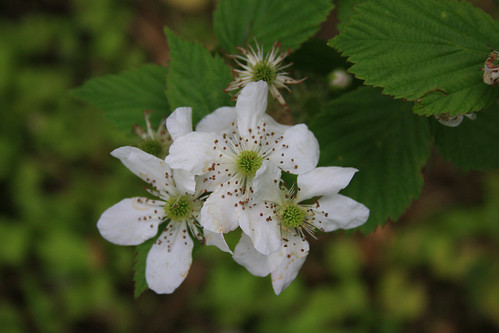
Blooming blackberries along homeplace fence.
(*photo credit)
May 15, 2023 Changing Lawn into Edible Landscape
Lawns are a luxury which on various occasions we mention should be reduced or eliminated where possible. We speak of fuel required for mowing and fertilizers, pesticides or scarce water that some place on lawns. Furthermore, lawns take on a monocultural routine of neighborhood expectations of "group think," truly a curbing of the freedom of property owners and how they will use their space creatively. Many lawn owners prefer not to risk possible criticism of doing something different from what the group determines. This occurs even when convinced of benefits from lawns with trees, productive vegetable and herbal areas, and wildscape for birds and certain wildlife. Complainers of too much work forget that, except for initial conversion, wildscape takes less time than ongoing lawn care.
In an age when productive land is in short supply, how about an edible landscape?This could includea varietyof fruit and nut trees, as well as various types of berries in smaller numbers at first and allow these to mature and spread over time. A gradualist approach has a number of advantages: domestic peace with neighbors who do not want dramatic changes in an abrupt fashion; a growing acceptance by all concerned over time; and the benefits of fresh fruit that is hand-picked in about five or so years. Tree care does take some effort, especially just after planting and in the event that the first years require watering saplings. Deer or rabbit problems may occur, and so protective screens and coverings on lower stems may be necessary.
Select fruit and nut trees that are well suited to one's microclimate, soil conditions, and potential domestic pest problems. To minimize trial and error, inquire from county agents or successful neighbors and friends what types to select. As we convert our two acres of parish church grounds to edible landscape, we have added a number of apples (some replaced due to rust problems), peaches, pears, cherries, plums, nectarines, mulberry, hackberry, pecans, hazelnuts, chestnuts, walnuts, hawthorn (bird feed), grapes, blueberries, raspberries, strawberries, and gooseberries. We allow border brush buildup so that small wildlife has edible landscape along with protective space even in an urban area. Some like "clean" space, but discover the value of wildscape for native wildlife (ground and regular squirrels, rabbits, and a host of birds).
A longer outlook. Patience has something to do with developing an edible landscape. After one decade, we in the parish have about 40 trees, a half dozen variety of shrubs, and about one-tenth of our extensive landscape is in productive vegetable and herbal space. Our town has ample yard and other space, so that we do not have to lease land for community gardens. Rather we regard this as a community meditation garden. We hope all flourish though we had to cut several older trees due to aging. In actuality, the summer shade offered by our mature trees has been a net savings that is deeply appreciated, for it allows us to curb air conditioning.

A lovely find in spring: Bloodroot, Sanguinaria canadensis.
(*photo credit)
May 16, 2023 Participating within a North American Community
Oil is just slick enough to make or break friendships, and we wonder what this will do to the traditional relationship between the U.S., Canada, and Mexico. Our Canadian brothers and sisters want friendship along this unguarded border. Conservative Canadians have put pressure on our U.S. federal government to accept dirty tar sands oil as fuel in a world that ought to be giving more attention to renewable energy projects; their dream was that we take the tar sands from up north and send it through an ill-fated pipeline to our Gulf Coast, even for possible trans-shipment to overseas markets -- if U.S. people would look the other way. Gluing us together in trade seems progressive enough and includes oil-producing Mexico as well. However, must we appease voices among our neighbors or look at this as a family controversy?
A broader vision. If we are brothers and sisters, we must be willing to see each other as such and not defer to powerful voices like Big Oil or certain leaders. That is intimidation from the outside, not discussion within a family. We certainly ought to be sensitive to the needs of our neighbors, but also be on the lookout as to how to make life better for all of us, not just the citizens of one or other country. Through closer union, we can appreciate the struggles of all of our families seeking to live a higher quality of life. Our three countries share much in common already -- land masses, sizeable minorities from the neighboring lands, security concerns, terrorist threats, interchange of populations on a regular basis, a common Christian heritage, the need for interaction on natural disaster issues, and trade and commerce.
Cultural riches and diversity. North America has welcomed many cultures over the past five centuries, and the native American population, for better or worse, has always proved hospitable to the newcomers -- who have not always proved the best guests. We are economically and culturally becoming more united and learning from Canada how to make bilingualism work for mutual benefits. Bilingualism for both Mexico and the United States would be a good thing for the sake of immediate communications and for the better understanding of diverse cultures.
A future good. Some North Americans complain that the Mexican undocumented laborers have replaced them through a willingness to accept lower-pay scales in the job market. That complaint may have a tinge of validity, but all too often the jobs accepted by illegal migrants go wanting without their presence. This means we would be without some of the food we eat without their contribution to the hard field work. The economy has been so constructed as to have a niche for the lower paying, difficult tasks of field harvest and other undesirable occupations. We need not put off any longer the fair and just legislation that would put many of such people (all too often Mexicans) on a path to citizenship. Why delay?

Twinleaf, Jeffersonia diphylla, Appalachian wildflower.
(*photo credit)
May 17, 2023 Treating Chemicals with Respect
The chemical spill a decade ago in the Charleston, West Virginia area opened questions about the toxicity of the coal scrubbing chemical that was used heavily, even though not fully tested. Decades ago, in the early days of USEPA a citizen's panel on which I served recommended that all industrial chemicals be thoroughly tested, for we should prove safety first, not after harm or potential harm occurs. Chemicals are full of mystery, quite complex in their structure and activity, but with unknown side effects. Chemicals in an acidic stomach can trigger discomfort and reactions with other ingested chemicals. Coroners say that two or more strong drugs can kill while addicts sleep; in some cases, it is nearly impossible to determine the precise cause of death.
It takes expensive analytical equipment to detect, isolate, and determine chemical structures; sometimes they prove unpredictable as to toxicity; they may have synergistic effects leading to even more severe toxicity when in the presence of other chemicals; they may be simply not thoroughly researched as to acute side effects or dangers due to long-term exposure. When required in large amounts, chemicals can do harm to unsuspecting workers and consumers. They may remain around for lack of natural detoxification potential; and they may not be disposed of easily because of inertness to natural decomposition -- and thus the need for complete containment (nearly impossible), or incineration or other safe disposal procedures.
A consumer culture of disrespect for materials extends to the manner in which one consumes or refrains from chemicals that may be helpful in small doses and toxic in larger amounts. At the turn of the century consumers avoided chemicals whenever possible; now they treat them with disrespect because they hear or see on TV that they have some good effects. For instance, hexachlorophene is a good anti-bacterial cleanser, but can cause brain damage in high concentrations. Chemicals essential to the body (e.g., vitamins) may be toxic in higher doses. Drug advertising is completely misleading for we who are unprofessional to know which one to take. This lax attitude makes users fear less, for familiarity breeds contempt. A decade ago, the rise in the number of deaths from drug overdoses in Appalachia and in other rural and urban areas of America had left most of us bewildered. Pinpointing oxycontin and removing it helped, but other low-cost toxic ones are present in increasing amounts.
In our neighboring county a social worker estimated that one-quarter of the people have a drug problem. When asked, my stock answer is, "No, it is closer to 90%"; all our population has a massive drug problem, because they are bombarded with over-the-counter drugs, prescription medicine, chemical food additives, and all domestic products (cleaning agents, paints, polishes, etc.). Stop medicine ads, remove additives from foods, make over-the-counter drugs less accessible, and improve drug treatment programs.It is time to show respect by acquiring and using only needed chemicals and properly disposing of the rest.

Lake of blue, along Canadian Rockies.
(*photo credit)
May 18, 2023 Seeing Spring Litter Cleanup as Necessary
During the month of May, we ought to consider the health of our rivers and the unhealthy treatment of landscape along with waterways. Yes, cleaning waterways and landscape demands tackling litter, trash, garbage, and throwaway problems. This is the negative side of consumer culture, because so much is made discardable after a single use and there is little mechanism and space to handle these disposable materials in a green and productive manner. In Kentucky and elsewhere we have a $500 fine for littering, and no one wants to pay such a bill.
A clean countryside is an enticement for potential tourists and sightseers who come to enjoy the natural beauty. A neat and tidy landscape is worth more in sightseeing and monetary potential. The littering is also a problem in other parts of the world as they enter the disposable consumer culture. Litter has the potential of destroying our livelihood. Let's not be tempted to bring in volunteers from outside the region to assist in something that ought to be done by local citizens. It is our people's carelessness along with our failure to enforce anti-litter regulations.
Volunteers loose enthusiasm when feeling that they are simply perpetuating a sorry state of affairs. Address the consumer culture with its tendency to allow disposals that make profiteers ignore returnable containers and expect society to do the dirty cleanup work. One method that does work in Kentucky is having those arrested for non-violent offenses spend time in community service in work release; it's better than the expensive alternative of spending time in jail. No one really likes doing such lowly tasks, but someone must do so, especially those arrested for littering in the first place.
One answer is quite reasonable. Let's clean up a little each day and begin today. The problem involves more than rivers and includes our roadsides, parks, playgrounds, and our own yards. Just reach down and pick up a little when out on a walk or run. If need be, take a small garbage bag along. I would never have said this a while back, but we know cleanup starts with us;if it generates a little anger within us, we may be influenced to report a culprit or pressure enforcement of our existing regulations. We may even challenge others who toss the soft drink can out the window. If others see us pick up litter, they may do the same and get incensed by the messy condition all around us.
Perhaps patience is needed, but it's not the only thing. Report litterers by taking license numbers -- but don't attempt actual enforcement. Continue to fight for a deposit tax on containers (10 cents a bottle) and for corporate responsibility to take back and reuse returnable containers. For enhanced civic pride let's get rid of litter and do our part in the cleanup.
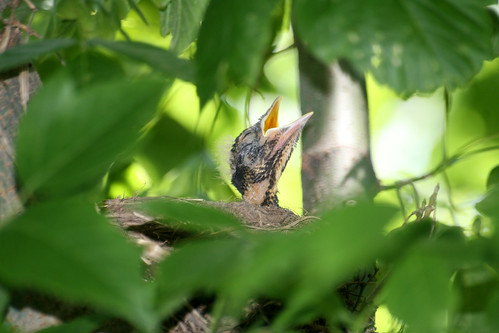
Spotted along a bike route near University of Kentucky campus.
(*photo credit)
May 19, 2023 Observing National Bike-to-Work Day
Today is not a distraction or a lark; biking is one ingredient in healing our wounded Earth, and we hope millions consider means of getting to work -- especially when commuting by auto. This is National Bike to Work Day, a good time to reflect on all the non-renewable fuel energy it takes for commuters who drive or even take public transportation from home to work and back. If this does not apply to those working at home, at least make it a conversation piece with those who may have the opportunity to get fresh air and save fossil fuels by thinking about using a bicycle.
I will never forget the single morning experience I had in Amsterdam, the Netherlands, five decades ago. I entered a busy street in rush hour and found it almost silent, except for the swish of hundreds of bikers going to work at rather rapid speed. Here was a bicycle economy and it was working. I presumed they all liked getting their morning exercise and breathing fresh air at the same time. At that time, I resolved and did go to work by bike when in Washington DC. However, biking makes us vulnerable to roadway surfaces and oncoming traffic. I had a spill on a bike on a gravel walkway as I cut across the Capitol grounds going to work -- and almost got hit by a bus on Independence Avenue coming from work. This mode of travel certainly works best in a bike friendly place.
Biking is not meant for everyone, all the time, or in every place. It takes skill, alertness, and energy to negotiate the bike in heavy traffic or over longer distances. Cyclists, when preparing for the day and concentrating only on biking, may lose the precious time otherwise given to organizing thoughts for the workday on public transport. The weather may also make biking quite uncomfortable and even hazardous. And not least, many commuters live great distances from work, and the routes may either not permit bikes or may prove dangerous even when using colored jackets and helmets. If just beginning to bike to work, take special care to plan the route, give enough time, have a safe place to park the bike, and dress properly for the trip.
Some extra observations: Remember, auto drivers out there are running late to work and are in a hurry. In our Appalachian region with heavily congested roads and narrow shoulders to the pavement, it is not always advisable to bike to work. If judged not to be safe, don't even risk it, for you do not have to be martyred because of shortage of bike lanes. Don't laugh; a member of our staff at ASPI, Russell Parmes, had a habit of biking and was killed on a Monday morning when a student was attempting to get to college fast. When lacking bike lanes, our auto drivers push the weak aside, and bikes must compete with these powerful vehicles. Better, spend the time working for bike-lanes and more friendly roadways. Tell that to previously biking Chinese who are buying cars at a rate of over ten million vehicles a year and their cities have all the extra auto congestion as well.
Being Of Service to Others
By Fr. Al Fritsch, SJ
Everyone can try to help the Lord in serving and caring for others;its part of our very life, like it was when Jesus washed the feet of his disciples. “A new command I give you: Love one another. As I have loved you, so you must love one another.” (John 13:34).We are to care for our neighbor now, as when we grow olderwe become dependent on others. We are not independent like we were a few years earlier and could drive and garden and cook. We can’t do that anymore --others do it for us, and this will be their opportunity to find growth in service.Though it’s not the same as when we were younger and mobile, there are countless ways to serve God by serving in our communities.And here it is that we may find our own humility and growth -- we are limitedand yet are asked to be of service.Following the whisperings of the Spirit will help guide us to know what to say or do as we care for one another.
A good example is my late neighbor Judge McClanahan. His livelihood and bliss as a retired person (since he couldn’t get out and get around much), was to play a keyboard with built-in styles and rhythms over the telephone for those who were shut-ins orjust lonely. This he did as part of his life work serving others, helping in some way -- an older person being creative and doing it by his own style. Therefore, we have to see ourselves as people who are called by the Lord not to do what we did when we were younger, but rather to experience the joy of helping others in a way which isin line with our talents,sharing God’s gifts freely at this very moment.
Who and how will we serve? We may find simple, yet profound ways to daily serve God as we serve each other.Through prayerful discernment and compassion for others, we can choose from many opportunities. Examine your life and find your gifts, skills and talents;what are you good at? How could you use your talents to help those around you? Are you good with children? Do you enjoy time with the elderly? Do you like to cook or bake? Are you good with your hands? Computers? Gardening? Organizing?We can do something to raise the spirits of those around us, whether it’s in walking together outdoors, or just sitting and chatting for a time - whatever it is - but we can share our service when we help others lift their own hearts.Sometimes all it takes to serve is to give a smile, hug, wave, prayer, Facebook message or a friendly call to someone in need.This is what we’re asked to do --find where we’re best able to help and do it with the grace of God.

Mother coyote spotted on dayhike. Washington Co., KY.
(*photo credit)
May 20, 2023 Filling the Carnivore Niche with Coyotes
Coyotes are now as American as apple pie, though that was not the case when I was young during the Second world War. Now, on a clear night in virtually every state except Hawaii, one can possibly hear the howl of the coyote, Canis latrans (barking dog) or, if the animals are closer, the high-pitched yips that they customarily make. Lewis and Clark called them prairie wolves. The coyote is North American to the core, a crafty cousin to our familiar dog, has a keen sense of vision, smell, and hearing, and is capable of living in a wide variety of places (mountain elevations, deserts, prairies and even Central Park in New York). Within our lifetimes, the opportunistic western coyotes have come east crossing the Mississippi, and they now inhabit all of continental North America except the very far north of Canada. They move rapidly, do not hibernate, and operate singly or in packs, night and/or day.
Coyotes have a quite adaptable lifestyle: they have discovered the advantages of living near human settlements and accessible food supplies, handily filling the environmental niche left by the demise or decrease of gray and red wolves, bobcats, and foxes. Coyotes hunt and can control populations of mice, rabbits, ground squirrels and even reptiles; in packs, they prefer a diet of plentiful eastern deer. However, their tastes are quite varied -- from carrion to fruits, berries and vegetable matter. In packs, they can attack larger livestock, from ponies to calves and even sickly cattle and horses. In suburban and even congested city areas coyotes look for outdoor pet food and even small cats (a favorite) and pups (large dogs can fight them off). Generally, the coyote is shy and stays at a distance from human beings. My friends, Phil and Mary Stern, have a pack of coyotes, which stay near their residence and act as watchdogs when they are away. They await their return and then slip back into the woods.
Coyotes generally avoid people, but attempts to feed them may endear them to a place. However, their coming too close could result in bites demanding painful rabies shots. Reports show about 200 attacks on people, especially in California, in the last four decades. Generally, sheep and cattle farmers out West regard coyotes as a notorious pest and hunt them down throughout the year, since they are non-game wildlife with no specific hunting periods (only daylight hours in Kentucky) and a bounty in some states. In fact, coyotes are America's most hunted animal. The government has a program to trap, shoot, and poison coyotes. Still, their numbers continue to climb and their range expands. Many folks with an environmental streak regard them as wildlife control agents.
Coyotes are certainly here to stay. They can breed with their wolf and dog cousins, forming the "coywolf" and "coydog," and even over time have the capability of forming a hybridized new species. They have found their biological niche and are using their crafty skills to survive. Listen for the howl of the American coyote.
Thank you to all of our supporters who have allowed us through the years to host www.earthhealing.info, featuring Daily Reflections by Al Fritsch (with Janet Kalisz' photos and design), Facebook essays and 132 videos on our Earthhealing YouTube channel. Al Fritsch has now moved to the Jesuit Community in Clarkston, MI, yet continues to provide his reflections and essays, and Earthhealing Youtube videos will continue to be uploaded through ASPI, the non-profit environmental demonstration center Al founded in 1977.
Your support for Al Fritsch's work and legacy is so greatly appreciated and now will be tax-exempt donations through Earthhealing, INC (rather than Kentucky Jesuit Missions). Donations may be made out to, and sent to:
Earthhealing, Inc.
(c/o ASPI)
50 Lair Street
Mt. Vernon, Kentucky 40456

Blue skies and sparkling water make for splendid memories.
(*photo credit)
May 21, 2023 Affirming World Cultural Diversity Day
From astronaut space photos, Earth's oceans shine like sapphires framed by green and brown land masses. These massive water bodies are fragile and can be damaged by mistaken policies. Today we can connect a celebration of world biological diversity to that of maritime matters and list environmental threats:
Corporate fishing. With increasing demands on shark fin soup and fish products of various types, the stocks of the oceans are being depleted at an accelerating rate. The world annual fish catch peaked at 86.4 million tons in 1996 and has gone down since to 78.9 million tons in 2011 (Total wild and aquaculture catch was 122 million metric tons in 2012 and 178 in 2021). Factory ships are greedy hauls with estimates as high as 40,000 square kilometers of seabed scouring per day, leaving dead zones that take decades to recover. Policing oceans has never yet been achieved and remains a global challenge because it demands coordination on the part of navies.
Rising oceans. The rises in water levels are due to warmer oceans with corresponding water expansion and addition of melt from glaciers and icecaps. This warming also can affect certain types of fish and marine life including the health of corals. Maps show land masses of where almost half the world's population living in seashores could be inundated by rising oceans by 2100. Entire Pacific nations could disappear, along with low-lying Florida. The rapid breaking off of the Antarctic ice shelf and the rapid melting of the Greenland ice sheet is accelerating that ocean rise during the past decade.
Tsunamis and oceanic storms. Within this century our planet has experienced two severe tsunami events that killed an estimated 200,000 people in the Pacific and Indian Ocean rims (December 2004) and did massive damage in Japan (March 2011), along with an extreme weather event in the Philippines that killed thousands and displaced large numbers. Improved early warning systems could have helped in at least the first case. Climatologists have predicted a correlation between ocean temperatures and climate effects -- and that does not bode well for the next generations.
Ocean acidification. Intake of the increased carbon dioxide emissions into oceans have resulted in larger degrees of acidification that has effects on many marine species and especially fragile coral reefs.
Piracy on the Oceans. Perhaps a bright spot on a dismal maritime picture is the improved policing of frequent pirate activities off the coast of Africa -- and this is the result of big money calling for safety for oil tankers and other precious cargo. When money and guns speak, it overwhelms pirate operations. What this tells us is that better enforcement of the oceans is called for on all fronts, especially to preserve the biodiversity of our oceans -- a possible major United Nations project.
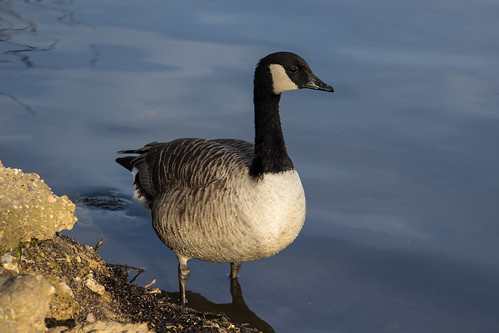
The Canada goose, Branta canadensis.
(*photo by P. Jane, Creative Commons)
May 22, 2023 Remembering Mother Goose and Nursery Rhymes
For many of us older folks it has been a long time since we have heard nursery rhymes. Recall "Humpty-Dumpty," "Little Boy Blue,” “Jack and Jill," and "Peter Piper picked a peck of pickled peppers"(or some two-dozen other of 75 nursery rhymes listed on the Internet under "Mother Goose"). Most of us in our early grades remember Mother Goose rhymes -- ancient memories still imbedded in our aging craniums. "Baa, baa black sheep have you any wool?" These ancient rhymes seem so innocent yet have political and other cultural significance that goes far back in history. One disputed theory is that one rhyme goes back as far as the Black Death in the 14th century (the first line on facial condition of victim, the second on flowers to protect against the smell, the third on cremation of victims and the last on death). What a rhyme! The first verse of the American version first written from the oral tradition in the 1880s goes --
Ring around the Rosies
Pocket full of posies
Ashes, ashes,
They all fall down.
Others have positive messages such as Humpty-Dumpty, where broken social relationships cannot be easily repaired. We find that we apply the moral proverbs almost instinctively, or at least hardly noticing what we are doing. Thus, preschoolers and kindergartners are becoming acquainted with the same verses we learned decades ago -- a passing down of authentic oral tradition. The act of passing down binds various age groups together within a culture. When we read, teach and even hear the same words retold that excited us when we were younger, we return to a state of mind and aspirations that were part of our early lives. It is like recalling a scent or taste, and this allows us to share with a new generation what we treasured with peers in our youth.
Today there is a movement to advance education downward to youngsters. Though pre-school programs only touch a minority of Americans, still these have a powerful socializing effect and are opportunities to prepare toddlers prior to the kindergarten and first years of formal education. Proposals have been made cut college indebtedness and for good reason. There are also proposals to extend federal assistance to pre-kindergarten kids and thus liberate low-income families to have more time to earn an income.
- Additional reasons couple social and educational benefits to youth with family benefits. Such programs allow parents to work in other occupations for added parts of the day. Educators are generally well experienced in child-rearing and thus qualify for the job-intensive occupation of pre-school programs. This is money well spent, providing far more jobs per million dollars spent than does catering to the military/industrial complex. Pre-schoolers learn nursery rhymes in company with others of their age. Let’s hope these opportunities are expanded very soon.
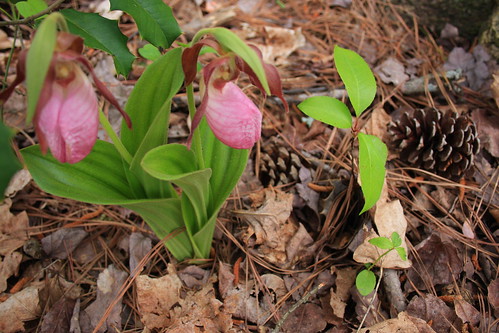
Pink ladyslipper orchid, Cypripedium acaule, in pine woods. Laurel Co., KY.
(*photo credit)
May 23, 2023 Sharing Good News with All Creation
Go out to the whole world: proclaim the Good News to all creation. (Mark 16:16)
We realize the need to interact and have empathy with plants and animals and thus connect Good News to all creation. Missionary workers awoke to a paradigm shift after Vatican II: the ones going out to the rest of the world with something to offer were not the complete possessors of the treasure of truth, only basic Good News as found in their own culture. Even receivers of their message were not devoid of some “Good News” worth considering, for communication is a two-way street. However, both the primary giver of Christ's message and the receivers are at the mercy of God, having gifts worth sharing even if not of equal status. The initial proclamation is that Christ has risen, and this gives rise to conversation, a sharing of many life-giving gifts.
The attitude of a primary giver as sole holder of a treasure to be dispensed is now changed; the giver is also the receiver and thus, in humility, must be open to give and to receive in conversation. Our eyes are even opened in the act of giving to the treasures we are presenting. This two-way conversation means not doing all the talking, but also some listening. We share Good News -- giving and receiving simultaneously. We learn to be good listeners through obedience in our own suffering with the Lord. We are humbled with the Lord so that we are not distracted by worldly allurements, which make us forget our mission.
Being with the poor makes us know our poverty as well. We learn to be transparent, to share at the heart, and to strive to converse with others. The poor realize that God alone satisfies and is the Giver of all good gifts. Thus, "to proclaim" means we have to be humbled enough to proclaim and listen -- and all creation hears in its own way, for we are drawn to natural sounds. We publicly proclaim that all share in God's good gifts -- and that is part of the Good News. Exaltation comes to all who suffer and enter into the Paschal Mystery. All creation moans in suffering and through its turmoil, creation is receptive to our sharing. We Easter people can proclaim our openness to all creation and show a willingness to see this as life-giving and renewing.In heralding, we accompany and even exceed John the Baptist, because we are announcing the presence of the Risen Lord among us.
Through modern means of communication, we can go out more easily to all the world. Within an atmosphere of openness, we can receive as well as give, inviting from others a profound sense of sharing. By listening and welcoming what others have to give and share, we proclaim a primary message of Good News: namely, that the other party is of worth. By opening ourselves to all creatures as teachers, we establish their own worth and redouble our efforts to protect and respect them. All creation says: Christ is risen!

Marbled orbweaver spider, Araneus marmoreus.
(*photo credit)
May 24, 2023 Respecting the Web of Life
I have set before you life and death, the blessing and the curse. Choose life,
then, that you and your descendants may live.(Deuteronomy 30:19)
The "web of life" is a combined scientific and ecological term (especially related to spiders and their artistic work) and a moral connection of all living creatures. Life is truly fragile and interlocked; mutual support given to various forms of life protect the health of all life. The marvelous nature of this web of living things is being better understood with time; just as the web implies mutual support, so environmental damage touches the entire planet. Melting polar regions threatens the habitat of polar bears and seals; invasive species crowd out less aggressive native one; forest-dwelling, red-cockaded woodpeckers depend on tree health. We are truly interdependent creatures.
The theological significance of the web of life is more complex. The web of all life is based on the dignity of the creature before the Creator, and the respect that follows from our gratitude for being called to be responsible for life on this planet. All living creatures have special worth bestowed by the Creator and we are called to be of service to others, not to be oppressive lords of Earth. Jesus' teaching and his washing of disciple’s feet sought to give us a grand corrective: do not be worldly masters but rather loving servants in a responsible manner. All beings give thanks by existing, but we humans express this through protection that may demand an active component at times. All life, especially human life, belongs to God; whoever among us attacks human life attempts to attack God's very self.
We express our gratitude to God for life through both words and respectful deeds towards fellow human beings and all creatures. We know we should not kill or steal, but we also must, in choosing life, realize the entire complex of interwoven rights and duties required to sustain interdependent life. We may defend ourselves against an unjust aggressor, but that does not mean we are to kill another who has made some mistake in our society. The power over human life does not belong to us. In order to preserve and protect this web of all living things, we extend the prohibition of shortening life to include the elderly, infirm, mentally incapacitated, the unborn, and all threatened and endangered plant and animal species. All are precious before God, the author of life; all have a right to dignified living and protection. Many of us eat plants and animal products, but some would like to prohibit eating of meat to all other humans.
In essence, the web of life is a reality treated both by science and Scripture, because it bears on our every action and calls for respect of all life.We recognize how life is fragile and requires our defense. Nuclear war could threaten all human life and planetary life itself. Our efforts much always be directed to defending that fragile lifeand recognizing our human limitations.
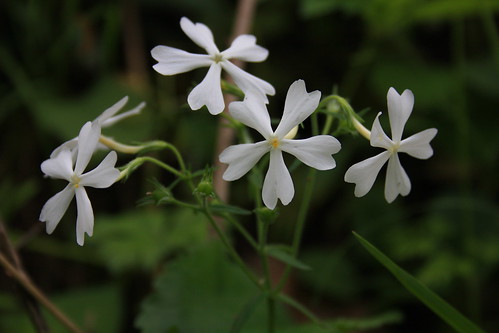
Unusual find: a white version of blue phlox, Phlox divaricata.
(*photo credit)
May 25, 2023 Discovering Consolation
Words of support
refresh the parched soul
like cool, bubbling water
from a hillside spring.
They are all the more welcome
when unexpected, and arriving
just when I'm down and out,
and have nowhere to turn.
They awaken within me
a sense of renewed hope
that I'll speak consoling words
to refresh another.

Mountain laurel, Kalmia latifolia. Bell Co., KY.
(*photo credit)
May 26, 2023 Avoiding Idle Speculation
Why are you standing there looking at the Sky?(Acts 1)
We keep looking to the heavens, and wonder as I did as a boy "Why did he leave us alone? Jesus could have moved about and walked the Earth, showing everyone that a 2000-year-old was alive and well." However, with time it became apparent that this would not have been faith, but a fearful sense of someone who is quite quaint. God does not do things this way, and it is part of our probing the divine mystery that we seek to grow with the Lord in godly ways of thinking and doing. Christ comes among us; he teaches, and he suffers dies and rises for us; he blesses us and ascends beyond our sight in majesty. And we anticipate the coming of the Spirit at Pentecost. We are wrapped in the mystery of Jesus' departure, and in what God wants each of us to do to be like Jesus. Yes, Jesus is ahead of us in time and we hope to follow.
We need to have a sense of belonging with and in the family of God, and that means we are invited to help prepare for Christ's coming. I recall a Californian adobe-maker who said with tears in his eyes, that I was the first to ask him such detailed questions about his craft. I regret I was unable to return and videotape his work, and so his skill was perhaps lost with him. We should do more, for part of the mystery of the Ascension is to treasure and encourage each person in his or her preparing for the Lord's coming. We do not want it delayed, for only God can help us get beyond the mess we are in. We believers in the Easter event see this gift of life's renewal as expressed through our hopeful actions; this is our part in hastening the day of the "New Heaven and New Earth" -- but we must believe it can and will occur.
We are not left alone; we have the presence of God in our lives, when we pray, in the creative act of the world around us, and in the real Sacramental Presence. But we are torn as a believing community. Jesus has left us and the departure is always bittersweet; we hate to see him go, and yet he must so that the Spirit might come and be with us. But even then, he did not totally go since he is present sacramentally even now -- for those with the eyes of faith. He beckons us to accept the Spirit coming to empower us, to make us work towards fulfilling the imperfect and unfinished. Like the Apostles we are slow learners, for at the moment of his departure they ask whether the Messiah would still come as a political leader.
"Go out to the Whole World and baptize them in the Name of the Father and of the Son and of the Holy Spirit." In this year of evangelization, we are called to spread Good News and to do so joyfully and with confidence that the Spirit will give us words when needed. Simple folks became saints by patiently awaiting the coming of the Lord and accepting the mysteries of Faith without being overwhelmed. The Ascension is our heralding call to renewal.

Attracted to skin oils, Eastern black swallowtail, Papilio polyxenes.
(*photo credit)
May 27, 2023 Cooperating During an Environmental Crisis
Believers of all faiths are essential to combat climate change and affirm that the Earth’s future is worthwhile. Maybe that very statement may precipitate controversy, because some religious folks consider the duty to be silently and vigilantly watchful and await the Lord's coming in time of disaster. This gets at the heart of difficulties dealing with environmentalism practiced by active and passive religious people. How do we overcome differences? Better yet, how do we discover points of togetherness and celebrate these common traits: God as over all things, respect for life and all of God's creation, need to be morally responsible individuals, dignity of people who suffer from environmental degradation, and hope that things will improve through mutual cooperation. Undoubtedly, this list is not exhaustive, and togetherness is still a challenge.
The challenge can become a balancing act: bringing together diverse personalities, agendas, goals, and presuppositions. I speak from the experience of being the first head of the "North American Conference on Christianity and the Environment." It is certainly not on my CV for a good reason-- it had its good moments, but infighting was extremely draining. Never again for me! It was not basic elements of religious understanding over the environment that brought friction; rather, it was different goals of persons with agendas as to where the group ought to be heading. I chuckle when I hear that two religious groups have come together on environmental principles. Of course, why not? They ought to agree, if they have valid religious aspirations. That's not the problem. Have them succeed in a common agenda when some hold passive faithfulness is enough, and others that we must change structures of society. Different agendas exist.
Challenges need not be pessimistic. Past experience teaches of pitfalls that can be avoided. One way is to focus attention on the environmental movement's total interaction, not on religious groups per se. Environmental cooperation can best be achieved by religious bodies working within a broader framework, including secular organizations and interests who strive for a future. Thus, a religious group can make a religious contribution without clashing with others over cultural differences and without attempting to pull one side over to certain interpretations held by strong religious leaders. Clashes have and can continue to occur among a wide variety of groups, but a basic collaboration is essential if we are to save our threatened planet from the effects of global warming.
What is the future of interreligious cooperation? Groups that can cooperate in working on drought or other natural disaster issues in conjunction with the UN and other relief organizations have a bright future; those that study historic pathways are okay. And climate change issues offer joint challenges as well. As for individuals seeking to establish grand sounding super-groups, watch out. Merely having a catchy title is not sufficient. What really is at stake?
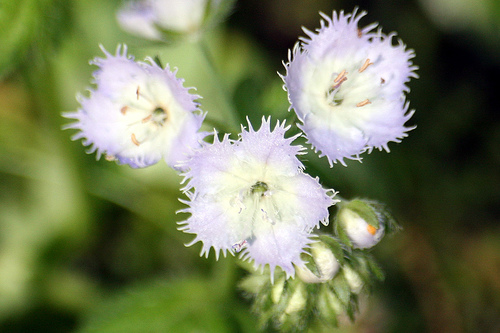
Miami mist, Phacelia purshii. Mercer Co., KY.
(*photo credit)
May 28, 2023 Discovering Pentecost in Our Spiritual Life
In the Jewish tradition, Pentecost, or the harvest festival, derives from the Greek word for "fifty" or fiftieth day after Passover. In our Christian tradition, Pentecost is the fiftieth day after Easter and is the day the Apostles and the entire praying congregation are filled with the Holy Spirit. This is the birthday of the Church, for, upon being inspired, the assembled believers leave the closed room where they are gathered and begin to spread the Good News boldly to crowds nearby. The strong driving wind that is mentioned at this first Pentecost reminds us of the spirit in the creation narrative in Genesis; the fire comes on each person as an individual gift bestowed as a unique inspiration; diverse crowds hear apostles speaking in their own tongues.
Pentecost is birth. The Word of God comes on the first Christmas and dwells among us. But now the risen Lord goes ahead of us and is exalted in glory. The joys and victories of Easter have come and we are now called to act like other christs and take the word out to all the world. So here we become part of a breathing Body of Christ, the Church, a community of love acting in a public way. This Body starts life on this first Pentecost and then continues to live and grow.
Pentecost is social. Being human and godly, the community of believers continues breathing. Inhaling, or an inward motion, means gathering and assembling to worship together. We become more alive through the inspiration of others who assist us in our spiritual growth in the Lord. These believing companions are inspired by the Spirit of truth, Who helps us overcome our divisions and experience our togetherness. Our lungs are filled so that we can take in the oxygen or graced moments of assembled people, a needed vitality.
Pentecost is breathing. We inhale the spirit and the fire. We leave at times and exhale the Good News we had inhaled in the assembled gathering. The process of inhaling (assembling) and exhaling (going out to others) is a rhythmic pattern that constitutes our Church life. We are not people who just hear the word and speak about it within a community; we are called to be like the apostles and make the word alive by proclaiming it to others. The Good News is that in going out we find more to bring back into the community from the scattered people, so that the outside world furnishes us with something that must be shared in the global atmosphere.
Pentecost is harvesting. In the assembly we have an opportunity to share in the fruit of the Good News. But that is only part of it. In going out from the assembled body we sow or scatter the seeds of Good News throughout the year and the world. Each Pentecost is a harvest, a time of returning to God some of the fruits of the harvest, a time when the fruit of the Good News is collected and brought back to the whole Church to be the inspiration for others.
Memorial Day
Memorial Day is a time to consider those who’ve passed and those who are passing; for some of us this means keeping connections through prayer. It is an opportunity for us to recall our past, those who lived beside us, those who we remember so well. The fading of time makes this even more important to bring these people back into our thoughts. That’s really part of what we should do at the end of every May – so how can we do that? This year, for the first time in two decades, I will not be able to visit Maysville’s Saint Patrick’s cemetery, and actually put an oxeye daisy on my grandmother’s grave, as I promised my grandfather that I’d always remember her. My mother put flowers on those graves, and when she ceased being able to do it, I tried to come each year and place wild daisies on her mother’s grave, along with her own. And so it is that we remember each other in a very special way. The visit to a cemetery grave site is one way in which we, on Memorial Day, bring back the memories of those who have gone before us. We can add other activities too, and the ways in which we can try to remember people that go beyond just the one month, one event, and cover the entire year.
For continued connection with those who are present, why not create a list of all the email addresses of people we care about and keep it available and posted where we work? The same could apply also to mailing addresses, phone numbers, as well as remembrances of stories and phrases that people used in their lives; something we can add to as time goes on. These tangible listings are very important. In my prior study I had a wall of photos and cards of people in my life. This reminded me daily of them, and of particular periods of time. We can do even more than that, we can write up these stories about our friends and relatives to celebrate their time and gifts, which will help us to remember them and those special times. We can also mark the events that were very important in their lives, such as weddings, birthdays, or when they came together in some fashion. These are the times that we bring back to memory, in order to not forget the people who are part of our world.
What should we do about obituaries? I see the written text of what people did in their lives, and so often all we do is read about them after they die. It is good to collect these and have them in booklet form so that we can constantly peruse their lives, these people that have meant so much to us, having some way in which we honor their efforts to make our lives better. At least we could go about recalling and bringing them back. In our daily lives we like to bring these back often, because they make us who we are. It’s important for us to consider Memorial Day as that special opportunity that we have to visit and decorate cemeteries and remember all our loved ones. Visit the individuals, those who are connected to them, and all who lived in our collective growth of humanity. Even if we suffer illness, or lack of mobility, there are many different ways in which we can connect, with phone calls, emails or even just with our positive thoughts – what’s needed is to have some connection that keeps these lives alive. The memories of those who’ve gone are important, and this is something of great value, especially at this time of year. Don’t forget the memory of our loved ones through prayer.

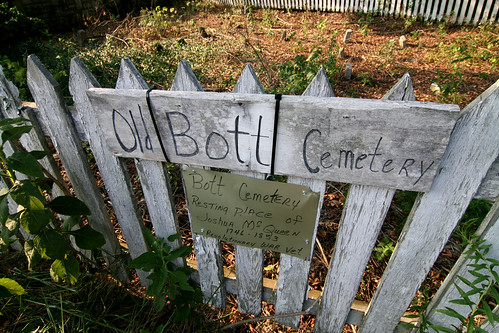
Old Kentucky family cemetery.
(*photo credit)
May 29, 2023 Memorial Day/Decoration Day
During the Second World War, on a Sunday near Memorial Day, our parish had a special afternoon called "Decoration Day." At these times we brought home-grown flowers by the buckets along with our lunches; Mama led the decoration of three generations of graves, and then we ate lunch with other relatives on the grassy undeveloped hillside beyond the cemetery grotto. On a full stomach we half-listened to a sermon by the pastor Father Rohr, who was handicapped by poor outdoor acoustics. I think this whole event was a throwback to days when it took so much time to get to Old St. Patrick's Cemetery from the surrounding countryside by horse and buggy. However, our memories were of car trips, though the gasoline was rationed. It made the visit, along with putting the flowers on the graves, a major Sunday affair. Few survivors can verify what transpired, for we elders now live with only memories of traditional Decoration Days.
The gatherings at cemeteries have decreased in popularity in recent years, but memorial events are important, even if done at non-specific times by small family clusters. Cars bring loved ones from distant places in less time than horses and buggies, and decorating graves is accomplished still meaningfully but quickly. The "family" comes back and is reunited in memories, prayers and placement of flowers on graves of those who have passed on. In more traditional parts of Europe the decoration and tending of flowers at grave sites is a signal that the memory is still fresh; when unattended, the grave is considered abandoned and the site is dug up, bones placed in an "ossuary" near or in the church, the grave reused -- and life goes on. Today, some circumvent these traditions by cremation and burying ashes or disposing of them in a dignified manner. What a pity that ash-scatterers forget the symbol of a designated sacred burial place.
Decorating graves is a physical act that shows public respect for the loved ones who sacrificed much for us. Decorating is a human act showing the joining of mortality and eternity. Our decoration shows a memory beyond the time of death, an appreciation of life, and a belief that life will continue after death when we will be reunited with loved ones. Flowers speak louder than words in this month of May; they remind us of the resurrected body that will rise from this sacred place for an eternal age. We strive to demonstrate, at least as long as we are able, our regard for the honored and loved ones who went before us. Love and respect are given with memory and flowers, both of which will last only a brief period and then pass on. Memories also can fade like life’s vitality.
Memorials through decorations say more than cold granite and lifeless monuments, no matter how well annotated. It is important while we are able to show signs of remembering, through human acts of decorating the sacred places of our ancestors. It is our little sacrifice of time for those who sacrificed much for us, and it makes us aware that this freshening of memories is part of our responsibility as keeps of family traditions.
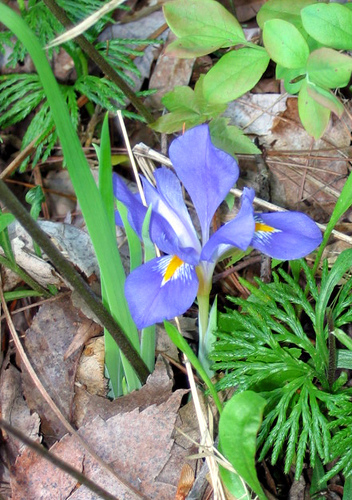
Red River Gorge hike finds drwarf crested iris, Iris cristata.
(*photo credit)
May 30, 2023 Reflecting on the Life of Joan of Arc
Joan of Arc is a patron saint of France and is a highly popular saint through the memorials, stories, movies, and books on her heroic life. She was born at Domremy in Champagne, the daughter of farming folks. Her interesting but very short public life included visions telling her to rise and help save the French cause in the Hundred Years War and to intervene in a local civil war. She led soldiers into battle with a banner bearing the words "Jesus, Mary" and helped save Orleans, thus her title "Maid of Orleans." She engaged in other successful struggles and stood at the side of the king when he was crowned at Reims.
But in a short two years of public life this humble illiterate teenager was betrayed and sold to the English, who accused her of witchcraft and tried her on false charges -- for which she had no professional theological defense. Joan was condemned to die at the stake on May 30, 1431, in the marketplace in Rouen before a company of English soldiers (not another woman present). As the flames leaped up around her, Joan kept her gaze on the crucifix and cried out, "Jesu, Jesu." They tell us each soldier remembered her last words until the day of his death. A member of the English royal court said, "We are lost. We have burned a saint." Some twenty years after her death, the family asked that the case be reopened. The documentation was presented, and she was declared innocent in 1456 and canonized in 1920.
I do not just favor French saints, even though I like both Sts. Odile and Therese of Lisieux. While having a French bias, I do champion the causes of other young female witnesses: Felicity, Perpetua, Agnes, Agatha, Cecilia, Elizabeth of Hungary, and the Lily of the Mohawks, all who showed fantastic courage. It must have been hard enough to be women who made a unique mark in their male-dominated worlds, but with the grace of God each of these succeeded in her own way. We know much about several of these and surprisingly enough about my favorite of the day -- Joan of Arc (1412-31), who should not be confused with Joan of Aza who died about 1190 and was the mother of St. Dominic.
Courageous people stir us; we are blessed to have the Joans of this world. They deserve special attention because they live in a culture that chooses strange heroes and heroines, and yet their virtues speak volumes for all people, young or old, male or female. Our world needs Joan and other saints who remained faithful to the bitter end. hey were mature in choices and knew sacrifices in ways we only hope to follow. Reading Joan's life still leaves two strong impressions: a deep uneasiness at those who betrayed, tricked and belittled her cause during her trials and moments of glory; and her own self confidence and bravery, unequalled by the multitude of brave male warriors through the centuries. Joan stays ever youthful in the freshness of courage she engenders; she is a perpetual virginal model, a person ready to obey the promptings of the Spirit, and one loyal to a cause worth fighting for. Joan is needed in this world today as much as six hundred years ago.

A sea of leaves. Violet woodsorrel, Oxalis violacea.
(*photo credit)
May 31, 2023 Reciting the Magnificat's Enduring Promise
Mary's song of joy is regarded as one of the most important prayers of the Church, so important that this is recited in the closing portion of evening prayer every day.
My soul proclaims the greatness of the Lord -- The entire being of Mary and of each of us and all creation manifests God's majesty. We, along with her, give full attention to the Lord.
... and my spirit exalts in God my Savior -- This is the ultimate saving deed of the God who saves all from our own destructive ways.
... because God has looked on this lowly handmaid -- Mary recognizes her own station before God and yet knows she has a very unique task to perform amid her simplicity.
Yes, from this day forward all generations will call me blessed -- Mary is blessed, and recognizes God's blessing on her and that this blessing is recognized by others as well for, in seeing Mary's blessings, we see that God has blessed us as well.
... for the Almighty has done great things for me. Mary's humility is seeing that there is greatness in God's gifts, not in what she has done, but in what God has done for her. The more we recognize divine gifts given to us, the more we are open to doing great things in this deep sense of gratitude for empowerment.
Holy is God's name. All in God-fearing reverence shout "holy," and exaltation is an openness to shout "glory" over and over.
Your mercy reaches from age to age for those who fear you -- and this applies in all times and across the breadth of creation.
You have shown the power of your arm. -- Here is the first part of the spiritual revolution, for God's spiritual power exceeds military muscle and corporate might.
You have routed the proud of heart -- Victory will come with the humble and not those who are proud.
You have pulled down princes from their thrones and exalted the lowly -- Mary is able to turn the tables on this world's order in the assent to and then the birth of Christ. She nurtures him to be who he is and for what he is to do. Hers is a whispered wish, a begging, a telling of fact, a swelling hope of simple folks.
The hungry you have filled with good things-- Those in destitution are now able to receive sufficient amounts for life both of body and soul -- and we are the hands of God at work.
You have come to the help of Israel your servant, mindful of your mercy-- Mary comes to the help of her kinswoman Elizabeth and extends God's mercy to her cousin. To aid one is to aid all.
According to the promise made our ancestors Abraham and Sarah and their descendants forever.-- We participate in the covenant of God's love. We may say the "Hail Mary" many times, but do we understand the power in words? Be here, Mary, at the hour of death when we pass to our ancestors. This is an enduring hope and promise.

